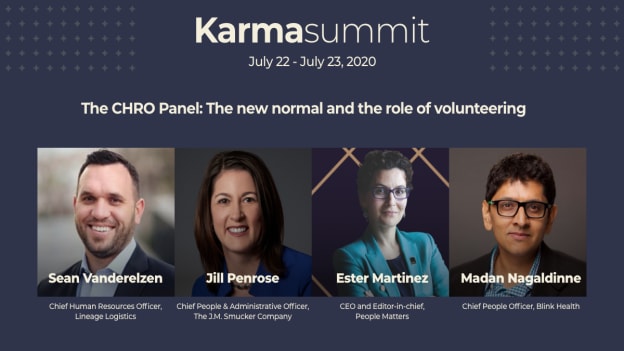Goodera Karma Summit CHRO panel on the new normal & the role of volunteering

The Goodera Karma Summit that ran July 22-23, offered an inspiring and innovative event from start to finish, drawing together a range of thought-provoking talks and workshops from leaders including Nobel Peace Prize winner, Kailash Satyarthi, Arianna Huffington, Ursula Burns, CEOs, CHROs and other leading thinkers in the world of business, people, work and beyond.
As a groundbreaking sustainability and CSR platform, Goodera is uniquely equipped to help people to do good for their communities when living apart - both during the COVID crisis and beyond. On Day One, I was thrilled to be invited to moderate a panel discussion on the new normal for CHROs, the value of care and the potential impact of volunteering on employee well-being. For the panel, I was joined by Jill Penrose (Chief People & Administrative Officer, The J.M. Smucker Company), Sean Vanderelzen (Chief Human Resources Officer, Lineage Logistics) and Madan Nagaldinne (Chief People Officer, Blink Health). We discussed how CHROs specifically are adapting to the new normal and the ways in which we can leverage volunteering to deal with enormous changes in areas such as remote work, wellbeing, racial justice and health and safety.
To start off, we took a deep dive into three main areas:
- What’s going on in the lives of CHROs?
- Double-clicking on the value of care - what is the value of care, internally and externally?
- What are the top challenges to keeping up morale and effectiveness?
“Dynamic doesn’t always mean good”
As food industry professionals, both Jill and Sean were immediately forced to confront the pandemic head-on. Globally, supermarket shelves were emptying fast. Lines were growing long as fear took hold and people rushed to access basic resources. As the CHRO of a warehouse and logistics company dealing in cold storage, Sean Vanderelzen had to tread the line between keeping workers safe and serving their customers and communities.
“The first thing we had to do was keep our people safe,” Sean says. “Safety is our #1 value. We want people leaving work in the same condition they came in or better.” To ensure this, the company hired a medical professional, put together a COVID handbook and “played close attention to the hour-by-hour dynamic that was happening during this time.”
And as Sean points out, “dynamic doesn’t always mean good.” He and the company have had to “change gears often.” Having to adapt operations under rapidly-changing, high-stress circumstances is something everyone at every level can identify with. In this respect, Jill Penrose highlights the importance of recognising and being conscious of the shock of the situation. “Part of our culture is focused on people and always has been,” she says, and part of that is “acknowledging the reality of the changes we have to live with together.”
The key word here is together. As Madan Nagaldine shares, “right now you’re isolated, psychologically with very little interaction with your peers. That’s something that came about almost overnight. None of us were prepared. How do you now, in your little room, build a sense of belonging?”
Communication is key
According to Madan, we are currently in the midst of a Digital Renaissance. “We’re seeing the future of work playout in real time,” he says. In this respect, there is no perfect playbook or fail-safe method for negotiating the landscape. Rather than trying to pretend they have all the answers, leaders are looking towards a kind of authentic transparency when it comes to communication.
Now more than ever, communication is crucial to building this sense of belonging and trust. For Jill Penrose and the J.M. Smucker Company, “it's about the connection,” she says, while emphasising the importance of “letting people know what will influence [the company’s] decisions and getting feedback.” In a world of information overload, Jill says it’s useful and reassuring for employees to hear a leader say “we as a company do not have all the answers, but we’re sharing what we do know.”
Building on this idea of transparency, Sean says he believes 2020 will be a year of learning, with communication one of the key tenets. “Why don’t we communicate like this all the time?” he asks. “We never have all the answers.” As an example, Sean pointed to a recent survey of Lineage leaders, in which they were asked if they felt the half-hour check-in phone call made every week was “a good use of their time.” Overwhelmingly, 99.5% of respondents said it was, which speaks to this eagerness for care and human interaction. Connection matters, even if it is virtual or very brief.
When it comes to conveying a message effectively, Sean subscribes to a method of seven times, seven ways.
“You have to communicate seven times seven ways,” he says. “You have to get sick of your own message before other people will take on your message.”
For Madan, one of the most critical parts of effective communication comes down to giving teams the answer to this question: “do I know what is expected out of me at work?” In the current circumstances, a true sense of expectation and purpose can easily be lost, especially in “a zoom-based, work-from-anywhere, globally dispersed environment,” Madan says. Leaders must be clear in their intentions and actions and build “expectation frameworks” in order to drive diversity and inclusion.
In an increasingly divided world, Jill also talked about the “responsibility and opportunity” companies have to keep their employees informed. She cited the experience of a team member saying they “look to the company” for guidance when it comes to understanding the unpredictability of the current situation, and what a loaded and important role that is for leaders.
“The Whole Person”
In matters of well-being - both mental and emotional - what part does volunteering play?
For Jill and the J.M. Smucker Company, it’s about The Whole Person. That is, looking at every aspect of an individuals’ well-being. “Our purpose as a company is: how do we support communities and create an environment where communities can thrive on a macro and micro level?” Now that it's harder to be together, J.M. Smucker is trying to facilitate ways to bring people together in enriching interactions that “strengthen individuals and strengthen communities.”
In addition to their Employee Relief Program, matching programs and giving opportunities, the company works closely with hunger relief non-profits such as Feeding America, “we made some adjustments in our giving to them to ensure they could meet their supply,” Jill says.
For Madan, altruism must be backed up by authentic action in order to have a meaningful impact. “This is not just a nameless, faceless corporation that is just doing business, but is making a difference,” he says. “The only way to do this is through action, not just putting something up on your website.”
“If you go back to the science of happiness you can link that to volunteering,” he says, invoking the book ‘Flow: The Psychology of Optimal Experience,’ by Mihaly Csikszentmihalyi. Madan recalls how, during his time at Facebook, he went on a three-day school-building trip to Rajasthan with his team. “Still, to this day, when I meet up with my colleagues, that’s the first thing we talk about.” In this sense, volunteering doesn’t just give a sense of belonging to the company, but a “sense of belonging to the universe.”
As for Lineage, Sean reveals they have joined with a global foodbanking network, partnering with pro-athletes and public figures such as Steph and Ayesha Curry to extend their reach as a company. For Sean and his Lineage team, giving back is a group effort, one that takes into account everyone’s priorities. “It starts with finding the right partner for what you’re doing and what matters to your employees,” Sean says. “This will drive engagement.”
Jill adds that it’s important to make sure employees are given continuous support, particularly when circumstances are changing at such a rapid pace. “The conversation that we had in March and April didn’t resonate with a lot of people,” she says in reference to mental health support. “But as time marched on people who didn’t need help, who had never needed help, needed those resources.”
Summing up volunteering in three words, the leaders had this to say:
- Jill Penrose: Community, Hope, Humility
- Madan Nagaldinne: Purpose, Belongingness, Community
- Sean Vanerelzen: Purpose, Community, Service
In this respect, the outbreak has only brought us closer, made us rethink the ways we are similar, rather than what divides us. Where we used to think of volunteering in terms of helping “others in need.” In reality, “others in need” can be any one of us.
Rounding out the first day of the Goodera Karma Summit, Arianna Huffington, Ursula Burns and Bloomberg’s Caroline Hyde talked about how we can rebuild communities, one volunteer at a time. Arianna Huffington’s observation that “when you are giving, and you see the overwhelming problems and pain people are dealing with, we are able to put our problems in perspective,” was particularly resonant, even more so in the current crisis. This leaves us with much to consider as we look ahead. What can we do to help, and how can we, as leaders, engage our teams to take action and better the lives of others?

















